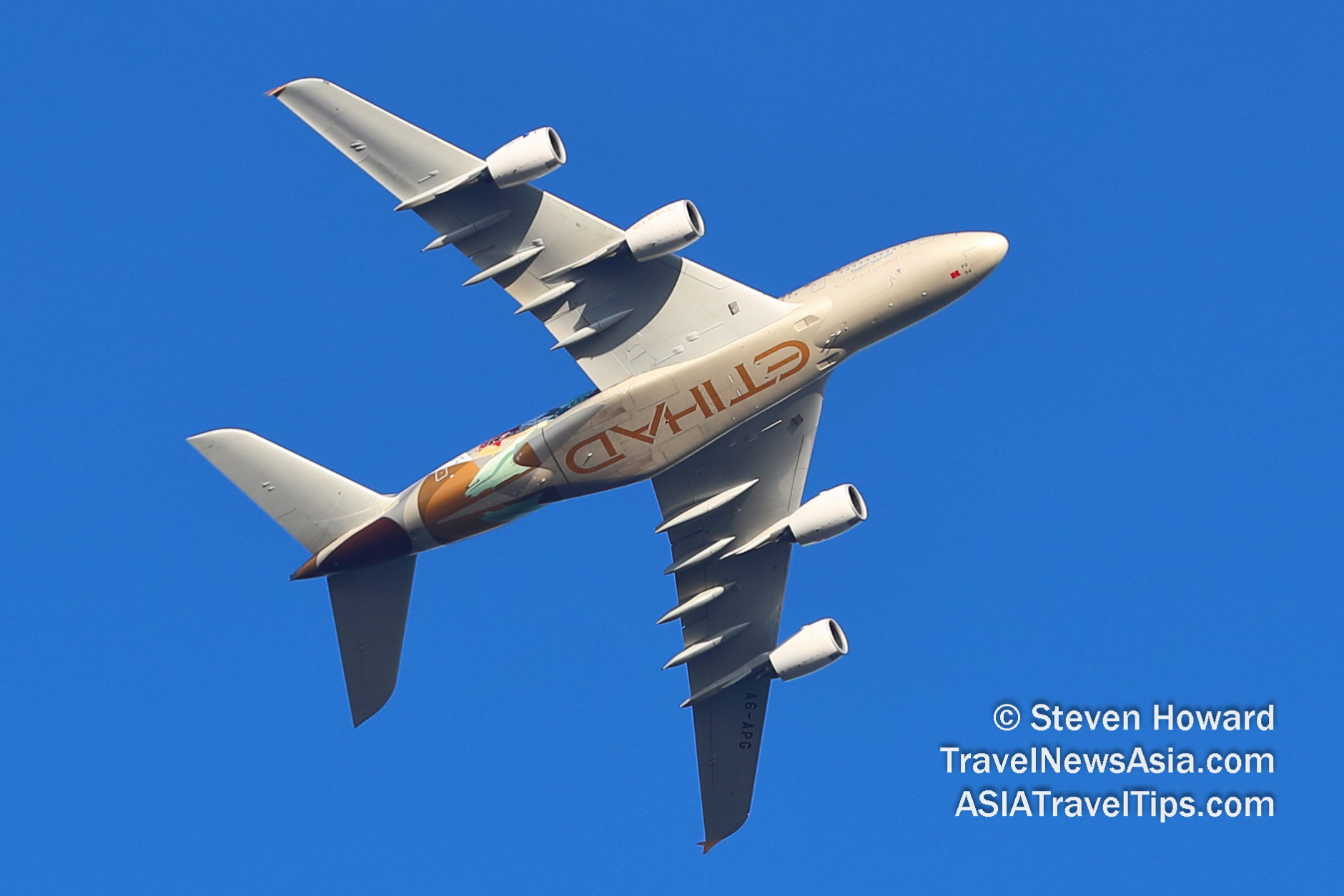|
(03 Mar 2022, 11:34 +07)
Etihad Airways'
results for FY2021 show a strong recovery in passenger
operations along with a significant improvement in financial
performance, with the airline posting a reduced loss of US$ 476 million for
2021, against US$ 1.7 billion in 2020.
The Abu Dhabi-based airline carried
3.5 million passengers in 2021, with an average seat load factor
of 39.6%. Passenger loads doubled in the second half of the year,
reaching 70.1% in December as travel demand peaked during the
winter holiday period. The airline recorded a particularly strong
surge in passenger volumes in Q4 following the September
relaxation of mandatory quarantine periods in Abu Dhabi.

Etihad Airways A380 reg: A6-APG. Picture by Steven Howard of TravelNewsAsia.com
Network capacity came in at 37.21 billion ASKs for the
year, with the airline connecting Abu Dhabi to 71 passenger and
cargo destinations across 47 countries. The airline launched or
restarted operations to 13 destinations in 2021, most notably
introducing scheduled services to Tel Aviv following the normalisation of relations between the UAE and Israel.
Etihad Airways posted passenger revenues of US$ 1.07 billion
in 2021, down by 14% year-on-year. While ongoing travel
restrictions and new variants of the COVID19 virus dampened demand, the
airline saw passenger revenues bounce back in the last quarter of
the year, recovering to 50% of 2019 levels in December.
Cargo operations meanwhile continued to outperform
expectations, with a 27% year-on-year increase in freight carried
in 2021 (729,200 tonnes) coupled with a rise in cargo revenues of
49% to US$ 1.73 billion, the highest figure in the history of the
airline.
"In another year of global uncertainty, Etihad
Airways has continued to move forward, strengthen its business,
and build on its world-class travel proposition," said Tony
Douglas, Group Chief Executive Officer. "Despite the slowdown
caused by Omicron, we are confident that the spring and summer
season will continue to see a resurgence in travel as more people
return to the skies. We look forward to our guests being able to
experience our state-of-the-art Airbus A350s when they debut later
this year, taking pride of place alongside our Boeing 787s. With
one of the most fuel-efficient fleets in the world and with
sustainability at the very top of our agenda, we will continue to
pave the way for more sustainable flying in 2022 and beyond."
As operations progressively ramped up
throughout 2021, Etihad maintained an absolute focus on cost
control, decreasing operating costs by a further US$ 110 million,
despite a US$ 197 million increase in fuel costs driven by
rallying oil prices.
Fixed overhead costs and
finance costs also recorded a significant reduction, decreasing by
14% (or US$ 110 million) and 20% (or US$ 90 million) respectively.
As a result, the airline managed to maintain strong liquidity in
2021.
Overall, Etihad recorded a core operating
loss of US$ 476 million for fiscal year 2021, representing a 72%
improvement compared to 2020 (US$ 1.7 billion) and a 41%
improvement against pre-pandemic results in 2019 (US$ 802
million). EBITDA improved by more than US$ 1 billion, turning to positive US$ 408 million from a negative US$ 651 million in 2020.
"Despite
COVID19 suppressing global travel demand for a second
year running, we have continued to transform Etihad Airways into a
more efficient business, delivering additional line-by-line
savings and further optimising our cost base. Our record cargo
operations have provided much-needed uplift, helping to more than
double monthly operating revenue between January and December,"
said Adam Boukadida, Chief Financial Officer. "Pushing the frontiers of sustainable financing, we
issued the first-ever sustainability-linked ESG loan in aviation,
while at the same time reducing our outstanding debt by more than
20%. All these factors combined resulted in a strong year-end
liquidity position, aligned to our pre-pandemic levels, and in a
steadfast 'A with a stable outlook' credit rating reaffirmed by
Fitch."
Strategy
Etihad Airways announced a proposed
transaction in December 2021 to divest a number of subsidiary
businesses to ADQ, one of the region's largest holding companies,
and to ADNEC.
The transaction is set to be
completed in 2022 and will support the continued development of
Abu Dhabi's civil aviation sector as well as enable Etihad Airways
to further sharpen its focus on its core airline business,
accelerating its transformation.
Etihad's joint-venture
airline, Air Arabia Abu Dhabi, the first low-cost carrier in Abu
Dhabi, continued to grow in 2021 with the launch of seven new
destinations, expanding its network to 15 cities by the end of the
year.
Fleet and network
Etihad Airways has a
strong network spanning major cities in Asia, Australia, Europe,
the Middle East and North America, which has continued to grow in
a measured way in 2021 as destinations have reopened and travel
demand has returned.
The number of passenger
destinations grew by 28% in 2021, from 50 up to a high of 64
during the summer peak, as Etihad Airways rebuilt air connectivity
to the vibrant capital of Abu Dhabi and tapped pent-up travel
demand.
Etihad's total fleet at the end of 2021
comprised 67 aircraft including five freighters, with an average
age of 5.7 years.
The backbone of the carrier's
fleet is the B787 Dreamliner. Etihad Airways
is one of the largest operators of this aircraft type in the
world, with 39 B787-9 and B787-10s in the fleet.
Etihad Airways is currently preparing to enter new Airbus A350
aircraft into service, with the first one set to take off in Q2
2022.
As well as launching year-round flights to
Tel Aviv and Vienna, Etihad Airways introduced seasonal routes to
capture leisure summer and winter demand, including new services
to Malaga, Mykonos and Santorini.
The airline
continued to build on its codeshare network in 2021 by
strengthening existing agreements with key partners such as Gulf
Air, and forging a new partnership with El Al. At the end of the
year, Etihad had 50 active codeshare partnerships, expanding its
network reach to more than 400 cities worldwide.
Products and Services
In 2021, Etihad Airways continued to
invest in developing a thoughtful and digitally enabled travel
experience inspired by Emirati hospitality, with health and
wellness assured at every stage of the customer journey.
Etihad was one of the first airlines globally to
trial and implement the
IATA Travel Pass as a solution to simplify
the storage of verified COVID19 tests and certifications.
The airline also introduced a Verified to Fly service
that allows guests to upload their tests, passenger locator forms,
vaccination certificates, and other necessary paperwork in advance
of their flight to confirm their eligibility for travel.
Etihad launched a new
Home Check-In facility, allowing customers to check in their bags,
choose their seats and collect their boarding passes and luggage
tags from their home, skipping queues at the airport.
People
While COVID remained a
dominant force, the airline�s workforce focus for 2021 was
two-fold: to continue protecting the health and wellbeing of employees while driving employee engagement.
In
2021, Etihad Airways became one of the first airlines in the world with
100% of operating onboard crew vaccinated to help curb the spread
of the coronavirus.
The carrier has now reached a vaccination rate of 95%
across UAE-based staff.
A salary reduction, carried over from 2020, was brought to an end in October.
At the end of
2021, Etihad's total workforce stood at 12,533 employees.
Cargo
Etihad Airways achieved a new milestone in 2021
by recording the highest cargo revenues in 18 years of operations.
Etihad Airways is a founding member of the HOPE
Consortium, an Abu Dhabi coalition formed to create a complete
supply chain solution to distribute COVID19 vaccines worldwide,
which has to date handled more than 250 million vaccine doses to
over 40 countries in the Middle East, Africa, Europe, Asia and
South America.
Pharmaceutical shipments using the
airline�s specialised PharmaLife product increased by 85%
year-on-year in 2021. The airline was one of the first carriers in the
Middle East to be awarded IATA�s CEIV certification for
pharmaceutical logistics and launched the first fully compliant
origin-to-destination pharma air corridor, between Abu Dhabi and
Brussels.
In a move to boost cargo capacity,
Etihad Airways has temporarily modified five Boeing B777 aircraft
to support cabin loaded cargo, operating over 800 charter and
scheduled cargo flights in the new configuration in 2021.
The cargo booking portal on etihadcargo.com was revamped
in 2021 to streamline the booking process to less than 45 seconds,
increasing web bookings by 36% within three months of launch.
Etihad Cargo maintained an on-time-performance and
delivered-as-promised rating of 85% during 2021, despite
operational challenges posed by global restrictions.
Sustainability
Etihad Airways is committed to
achieving net zero carbon emissions by 2050 and in 2021 achieved a 5.6% reduction
in the emissions intensity of its passenger fleet in 2021.
In 2021, the airline united key industry OEMs to form
the most comprehensive, cross-organisational initiative ever
undertaken to reduce CO2 emissions in aviation. The airline's
sustainability programme, previously focused on its fleet of GEnX-powered
Boeing aircraft under the "Greenliner Programme", was expanded in
2021 by a similar initiative focused on Rolls Royce XWB-powered
Airbus A350s under a programme called "Sustainability50". Both programmes are aimed at researching and developing new
technologies and methods of flying to aid decarbonisation efforts
and enhance operational efficiencies.
The carrier operated its most sustainable flight ever in 2021, from
London Heathrow to Abu Dhabi. The flight leveraged two years of
research to reduce emissions by 39,000kg, or by 72% in absolute
terms compared to an equivalent flight in 2019, using a
combination of a high blend of SAF, contrail reduction, efficient
airport handling processes using electric tractors, a highly optimised flight routing and more.
The airline also
committed to adopting 400 mangroves, one for each passenger
onboard its most sustainable flight, and has bolstered this
commitment by forming a new partnership with Jubail Island in 2022
to plant a further 182,000 mangrove trees over the next five years
in Abu Dhabi.
The carbon emissions of the
airline�s signature Etihad Greenliner aircraft were completely
offset for the entirety of 2021, totalling 79.4 tonnes of CO2
emissions across 834 flights, as part of the first carbon offset
programme in the region.
Etihad also launched a green loyalty programme in 2021, called
Conscious Choices, which rewards members of Etihad Guest for
making sustainable choices in their day-to-day lives to reduce
their carbon footprint.
In 2021, Etihad Airways
raised US$1.2 billion in the first sustainability-linked loan
(SLL) tied to environmental, social and governance (ESG) targets
in global aviation, making it the largest sustainable financing
deal in the airline�s history and the third innovative financial
deal in three consecutive years, following a first-of-a-kind
sustainability-linked transition in 2020 and a loan tied to
the UN Sustainable Development Goals in 2019.
Nearly 30% of the airline�s global supply chain is driven by
UAE-based businesses, and Etihad Airways is actively growing and
accelerating its local spend through a programme called Al Watani
to support the development and sustainability of local businesses
and communities in the UAE.
|
Headlines: |
|
|
